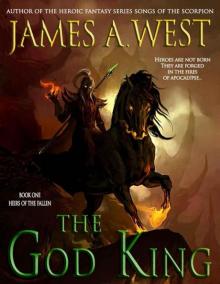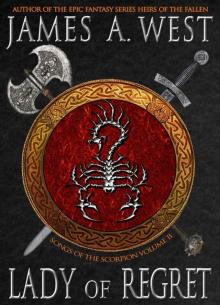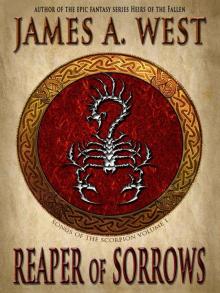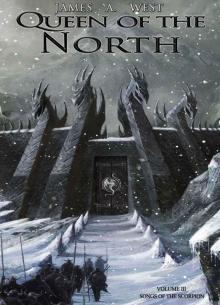- Home
- James A. West
The God King hotf-1 Page 23
The God King hotf-1 Read online
Page 23
Varis turned his study on the folk who were departing the gate, and those turned away. None made their way down the road, but rather peeled off and crossed the boulder-studded slope of the pass, making for a chaotic tumble of rock at the wall’s southern edge. The rock-fall had not been there when he left Ammathor, and the scarred cliff face rising above it showed where a large portion of the mountain had collapsed. Thousands of people wandered aimlessly amid the massive stone slabs. Further scrutiny revealed countless gatherings of tents and canvas-covered wagons. Farther off, shepherds bearing spears and swords guarded livestock contained within large rope pens. With nowhere else to turn, Varis concluded, nearby villagers had come to Ammathor for protection. He could only imagine that a similar tableau waited on the eastern edge of the city. How many more would come from every corner of the kingdom?
Considering that, Varis looked back the way he had come. Normally, from the River Malistor onward, the road was packed year-round with wagons loaded with goods from all over the kingdom. As well, craftsmen by the thousand brought their wares to Ammathor, where they could fetch much higher prices than in villages and border fortresses. Now the road was empty, and the tracks he had seen in the powdery dust showed more sign of serpents and scorpions than of men. It appeared that the migration to the king’s city had dwindled off.
For the first time since leaving Ellonlef to deliver his message to Kian, Varis took stock of what he had unconsciously noticed on the road east, and quickly concluded that he had seen very little of men, even after crossing the River Malistor. The crofter and his small farm had been a rarity. There had been no Bashye, no merchant caravans, or any other travelers. Most commonly, villages and towns had been desolate, their sole inhabitants starving dogs and rolling tumbleweeds. At the time, he had paid little attention to the scenes of abandonment. in truth, he had allowed himself to become overly captivated with his growing power.
It took another hour to reach the wall, and from there Varis began searching for a suitable place to climb over. He did not want to make himself known until he sat the Ivory Throne, so he avoided all people, and stayed well clear of the gate. His efforts were not difficult, for people were obviously too concerned with themselves to worry about one lone man among the hundreds wandering about.
By the time Varis found a route that appeared relatively safe, the day had passed and yet another smoky, crimson dusk was approaching. Night had fallen by the time he had carefully picked his way over the treacherous remains of Edaer’s Wall and moved into the edge of the city, which had once been dominated by bustling warehouses, bazaars, and artisan shops.
Though he expected the worst, the scene that greeted him was far worse than anything he could have imagined. Not one building in sight remained unscathed, and many had fallen in on themselves. The plastered walls of those still standing were blackened and cracked from fires that had swept through the entire district. Mounted patrols roamed the debris-littered streets, but the soldiers paid scant attention to the few looters and scavengers hunting amid the carnage for anything of worth. What Varis noted above all else were the hollow eyes and sunken cheeks of everyone he saw, even the soldiers. These people, he thought, are ripe for the plucking. It would take little to turn them to his side.
As he pushed deeper into the city in an effort to reach the king’s palace, the extent of the destruction grew, as did the suffering. The sick and dying wandered aimlessly in search of food and anything they could use to build a fire to ward against the unnatural cold. The rotting dead were carelessly heaped in every alley. More than once he saw men, alone or in groups, catch solitary women and drag them amid the dead and shadows, indifferent to the reek of rotten flesh as they satisfied bestial lusts normally held in check by the king’s law. Children, quicker on their feet and more keenly alert to all the new dangers, ran in packs, like feral animals. One filthy group of urchins fell on a starving dog, bludgeoning it with sticks, and then ripping it apart with their bare hands to enjoy a hot, bloody meal.
At one time, Varis might have been repulsed by the detestable goings-on, but no longer. The city was literally starving to death, tearing itself apart in desperation. In all the faces he saw people pushed to the point that they would accept any authority over them, as long as that authority offered a reliable supply of bread, a warm place to sleep, and a modicum of safety. He could not have asked for a finer gift.
After much longer than it should have taken, what with the usual route often blocked by one obstacle or another, Varis spotted the looming walls ringing the king’s palace. Built originally for defense with granite hauled down from quarries carved into the Two Brothers, the towering curtain wall and blocky barbican gate looked forbidding rather than inviting, no matter that white plaster cloaked gray stone. Arrow slits cut vertical slashes in the thick walls, while covered wooden galleries stretched along the tops, hiding the presence of all but a few watching guards. Cracks showed here and there, but for the most part, the curtain wall seemed to have escaped the damage the rest of the city had suffered. Varis concluded that the rest of Ammathor might have suffered more at the hands of the citizenry, than from quakes and the burning stars that had fallen from the heavens. If so, then it proved to him that no army could ever wreak the level of havoc on a city as could a desperate citizenry. He tucked that thought away, saving it.
As he closed on the palace, the racket of thundering hooves drew Varis’s attention. A large man, followed by twenty lancers, charged out of the barbican gate. At the last instant, the leader reined in, shock evident on his face. As were all soldiers of the House Guard, the man Varis knew as Igindu was clad in a long, pleated green leather kilt, his chest protected by a breastplate of hammered bronze. From his shoulders hung a green and gold cloak. Igindu also wore the triple-knotted scarlet cord over one shoulder that denoted his rank as a master of spears. While the man was yet plump, hunger had whittled him down to half his former girth.
“Prince Sharaal?” the man blurted uncertainly. “How have you come to be here, alone?”
“Your eyes deceive you, Igindu,” Varis said to the man who had taught him the sword. Behind the soldier, the lancers were all staring like fools. “It is not the father who stands before you, but the youngest son.”
Igindu’s sagging features jiggled with uncertainty. “Prince … Varis? Gods good and wise, you have grown into a man since you-” he cut off abruptly. “By the gods, where have you been? Your family has been mad with worry and grief. King Simiis sent out four legions to search for you across the desert, north toward Izutar, south to the border of Tureece, and east across the Golden Plain. Before this occurred-” he waved an arm around the city’s ruined state to express what he could not voice “-King Simiis was preparing to march on Tureece, thinking you had been captured.”
“The letter explaining my intended journey must have been misplaced,” Varis said with bland indifference. Before Igindu could respond to that blatant lie, Varis added, “You thought I was my father, so I must ask, if Prince Sharaal is not in the palace, where is he?”
Igindu’s eyes went hard with mistrust, just for a moment, then softened. “Soon after the Three were destroyed,” he said, all but choking on the words before rushing on, “King Simiis received word from Lord Marshal Otaker of Krevar that a formidable army was soon to march on Ammathor.”
“That is all?” Varis asked, keeping a keen watch on Igindu’s reactions. “Otaker gave no other description?”
Igindu spread his hands above the pommel of his saddle. “The king, all of us, could have hoped for more, but that was the extent of Otaker’s warning. We have heard nothing since, so it was feared that the army he warned of overran Krevar. That is reason King Simiis sent your father and mother into hiding, along with nine of Ammathor’s twelve legions, including the Crimson Scorpion Legion. Your grandfather feared that with Edaer’s Wall fallen, as well as Dawn’s Wall to the east, an army that could decimate Krevar could also pose a dire threat to Ammathor. He wanted to ensure that
if such happened, your father would be able to assemble a counterstrike.”
Varis found no deception in the explanation. “What of my brothers?”
Igindu swallowed and looked away. “You Highness, your brothers perished while hunting in the mountains. I found them myself, amid a landslide. They….” his voiced dwindled to a sigh, and in the end he shook his head in despair.
Varis hid his smile. Ever had he despised his brothers. To the last, they had fancied themselves future warrior kings. At best, they had been but warriors of silken sheets and fat pillows, given to making sport of bedding adventurous highborn ladies and their insipid daughters. And when not so engaged, they had idled away their miserable lives hunting the crags of the Two Brothers. He was only partly glad that their distractions had saved him the need to slay them himself.
“Rouse my grandfather and his councilors,” Varis abruptly commanded. “I have word of the advancing army.”
Igindu blinked, as if trying to understand why Varis had not said as much straight away. “You mean there is such an army? Where is it … who leads?”
Varis’s teeth ground together, glaring at the blubbering fool.”As you can see, I come alone, and without horse. My journey, of late, has been exhausting and fraught with peril. I will reveal all, once those who need to hear are assembled. I will await that assemblage in the Golden Hall.”
Without another word, he brushed by a blustering Igindu and entered the palace grounds.
Though the scale was less than the king’s city, the grandeur of the palace was nearly overwhelming, even to Varis, who had grown up in its shadow. Marble and alabaster had been used in all the stonework, from the simplest fountain to the highest domed spire. The pathways, wide as streets, were lighted by firemoss lamps and paved in pebbled quartz of rose, white, and amber. Flowers and shrubs of every hue and scent, brought from the far-flung corners of the world, grew in proliferation. Even now, with the city in a shambles beyond the curtain wall, the usual highborn took their ease, clad in bright clothing. As always, Varis thought they looked like a strange breed of peacocks set to wander as they would. Most were taking their ease around fountains, or lounging on benches. The difference now, he saw, was the concern etched on every face. Even on highborn, the cataclysms and subsequent uncertainties had taken a toll. Slaves, wearing only white tunics despite the cool air, scurried under the burden of golden platters filled with food, their copper slave anklets tinkling. Not a few played harp or flute, making delicate music for the cultured ears of their indifferent masters.
Varis’s hood shadowed his grin. By dawn, these highborn wastrels would bow and scrape for him. His inner pleasure had nothing to do with a sense of mercy for the slaves, or granting retribution for them. Rather, his harsh joy came at the idea of seeing Aradan’s nobility made impotent and brought to a place lower than any had ever conceived for themselves. He would show them the vanity of their plotting and maneuvering. He would laugh as they choked on tears of outrage and shock. And when his laughter died, so too would the most useless of them.
He made his way through the palace, his now dusty robes and concealing hood earned only looks of curiosity mingled with disgust. Most people did not seem to recognize him, and those who did obviously disbelieved their eyes. At any other time, in his current condition, Varis would have been halted and questioned, but the world had changed, and uncertainty had a way of freezing the hearts of men.
He made his way to a pair of guards outside a set of doors as wide and tall as any found on a stable. These doors, however, carried more wealth in jewels, gold, and ivory than a small kingdom had in its coffers. Beyond the entrance to the Golden Hall waited the Ivory Throne, the seat of Kilvar kings for a thousand years.
“You Highness,” one of the guards said with a low bow. “We received a runner telling of your safe return.”
Varis gave the barest nod of greeting, and waited while the other guard hastened to push open the golden doors. Heavy as they were, the doors swung easily on silent hinges. Scores of nobles and the realm’s highest ranking officers waited within. While it was somewhat surprising that so many had been summoned so quickly, it pleased him that they had. The more eyes that witnessed what was about to happen in this vaunted chamber, the beating heart of Aradan, the faster word would be spread of his accession.
He allowed himself a moment to study his prize. At the farthest point from the doors, a stepped pyramidal dais rose from a broad base to a narrow pinnacle, upon which sat the Ivory Throne. The great chair, presently vacant, waited massive and ornate. It was built of immense and intricately joined curving ivory tusks, every inch of their length swirled with silver and gold inlay, and studded with sapphires, opals, and diamonds. Legend claimed that a score of men had struggled to set the throne in place. Varis did not know if such was true, but he did know that if the doors to the golden hall could buy a small kingdom, the worth of the Ivory Throne could buy ten.
At the base of the dais, a double row of white-kilted advisors and ministers sat on cushioned stools, speaking excitedly amongst each other. Varis knew these appointed men were not traitorous to Aradan, but they were self-serving nearly to a traitorous degree. Thus far, no one within the Golden Hall had noticed the opening doors and the figure waiting to enter. The herald’s booming voice changed that.
“Prince Varis Kilvar, heir to the Ivory Throne of Aradan, Keeper of the Kaliayth in the West, and Holder of the Golden Plain in the East!”
All heads turned toward him, and a collective gasp went through the assemblage followed by low, uneasy muttering. Only the officers in the galleries above the floor of the hall responded with proper decorum, each drawing his sword, pressing hilt to heart, the tip pointed toward a vaulted ceiling covered with colorful mosaics.
At that moment, King Simiis strode into the Golden Hall through a doorway reserved for the king alone. The mutters cut off at once, and all knees bent and heads were bowed in reverence. Simiis, always a hard man, glanced toward his grandson with unreadable eyes black as onyx. Varis, unbowed, waited in silence as the king slowly stalked toward him over alternating tiles of blue and white marble.
Simiis, past sixty years, was still as straight and strong as a man thirty years his junior. Varis was of a height with the king, but Simiis was broader across the shoulders and deeper of chest. His top-lock hung thick and white as snow. Clad in a long crimson kilt slashed with white, he was the figure of unbending will and potency that had guided Aradan over two score years. His reign would end this night.
“Master of Spears Igindu informed me that you had word of an advancing army,” Simiis said without a word of greeting, his voice deep and rough. If not for Simiis’ unconditional love for his children, an adoration that had spoiled the get of his loins, Varis had no doubt that Aradan would still be the kingdom it had become soon after King Edaer Kilvar took up the scepter. Instead, the kingdom was debauched and perverse, a land overrun by human leeches, and treacherous highborn all too willing to present their flesh to the bloodsuckers in order to ensure they retained power and wealth.
When Simiis halted before Varis, the prince nodded. “The advancing army is me.”
The king scowled. “What-”
He never finished the question, for Varis slapped his palm against the king’s naked breast. From beneath the ends of his suddenly glowing fingers, filaments of black invaded the king’s dark skin and spread in an ever-widening web. Simiis’s eyes bulged in horror, and his teeth clamped down on his bottom lip. His jaw worked furiously, teeth gnawing a ragged gash into the tender flesh. Scarlet began to course over his square chin. Gathering all that remained of his strength, Simiis flung himself back with a strangled, disgusted cry, eyes swimming with fear. “W-what are you?”
Varis did not answer.
He raised his hands and slowly pushed back his hood, revealing eyes of burning pearl and a face the hue of burnished bronze. His inner light swelled until that radiance filled the Golden Hall. Highborn, lords marshal, and advisors all howl
ed in fright at the sight of his visage. Some recognized that death had come into their midst, and as fright became unrestrained panic, they bolted for the doors, dragging and pummeling at their fellows in order to be the first to escape.
Before any could flee the throne room, Varis raised his arms, releasing gouts of liquid ice to splash over the doors and windows. In a blink, that unnatural ice crystallized into a foot-thick skin stronger than any iron ever forged. One councilor reached the king’s door, his hands sticking fast when they touched that frozen barrier. In moments, delicate feathers of hoarfrost had spread up his forearms to the elbows. Others slammed into him, burying him under a seething mass of fearful men and women. All screamed and howled their terror.
Varis looked to his grandfather and grinned in satisfaction. Simiis had backed a little way off, but now stood immobile, his dark features a sickly yellow pallor. Varis’s palm had seared a black print, from which rose tendrils of smoke. Pink wetness flowed down from that dread wound, leaving a string of inflamed welts.
“What are you!” Simiis shouted again.
Varis’s voice boomed through the Golden Hall. “I am the Destroyer of the Well of Creation and Geh’shinnom’atar. I am the coming king, emperor of the coming dawn. I am the god of men!”
He stepped forward and caught his grandfather’s face in his blazing hands. Infinitesimal black threads branched out under the king’s skin, burrowing like worms into his flesh and organs. Simiis’s screams became a single piercing note of agony. No matter how he struggled, he could not break free. The king’s cheeks sank inward, his once proud features contorted by a grotesque sneer.
Varis shoved the wilted figure away. Simiis staggered, weakly brushing his hands over his skin, as if to dislodge a stinging host of ants. By now, his howl had closed off to a rattling gurgle. He abandoned wiping at his skin and set his nails to work, clawing, digging, leaving furrows that steamed. Of a sudden, Simiis went still. His fingers rose to his throat, and his mouth yawned wide, loosing boiling clots of blood that gushed past his teeth and spattered on the marble tiles with a hiss.

 The God King hotf-1
The God King hotf-1 Lady Of Regret (Book 2)
Lady Of Regret (Book 2) Reaper Of Sorrows (Book 1)
Reaper Of Sorrows (Book 1) The God King (Book 1) (Heirs of the Fallen)
The God King (Book 1) (Heirs of the Fallen) Heirs of the Fallen: Book 02 - Crown of the Setting Sun
Heirs of the Fallen: Book 02 - Crown of the Setting Sun Heirs of the Fallen: Book 03 - Shadow and Steel
Heirs of the Fallen: Book 03 - Shadow and Steel Heirs of the Fallen: Book 04 - Wrath of the Fallen
Heirs of the Fallen: Book 04 - Wrath of the Fallen Queen of the North (Book 3) (Songs of the Scorpion)
Queen of the North (Book 3) (Songs of the Scorpion)